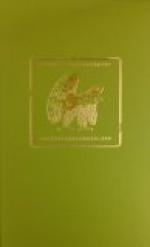The blue lights flashed in her eyes; her lip trembled. “Be fair,” she said. “You can afford to be—generous.”
“I am going to be generous, Miss Armitage, to you.” The ready humor touched his mouth again, the corners of his eyes. “I am going to take you over the ground with me; show you Weatherbee’s project, his drawn plans. But afterwards, if you outbid me—”
“You need not be afraid of that,” she interrupted quickly. “I—you must know”—she paused, her lashes drooped—“I—am not very rich,” she finessed.
Tisdale laughed outright. “Neither am I. Neither am I.” Then, his glance studying the road, he said: “I think we take that branch. But wait!” He drew his map from his pocket and pored over it a moment. “Yes, we turn there. After that there is just one track.”
For an instant Miss Armitage seemed to waver. She sent a backward look to the river, and the glance, returning, swept Tisdale; then she straightened in her seat and swung the bays into the branch. It cut the valley diagonally, away from the Wenatchee, past a last orchard, into wild lands that stretched in level benches under the mountain wall. One tawny, sage-mottled slope began to detach from the rest; it took the shape of a reclining brazen beast, partly leopard, partly wolf, and a line of pine trees that had taken root in a moist strata along the backbone had the effect of a bristling mane.
“That is Weatherbee’s landmark,” said Tisdale. “He called it Cerberus. It is all sketched in true as life on his plans. The gap there under the brute’s paw is the entrance to his vale.”
As they approached, the mountain seemed to move; it took the appearance of an animal, ready to spring. Miss Armitage, watching, shivered. The dreadful expectation she had shown the previous night when the cry of the cougar came down the wind, rose in her face. It was as though she had come upon that beast, more terrifying than she had feared, lying in wait for her. Then the moment passed. She raised her head, her hands tightened on the reins, and she drove resolutely into the shadows of the awful front. “Now,” she said, not quite steadily, “now I know how monstrously alive a mountain can seem.”
Tisdale looked at her. “You never could live in Alaska,” he said. “You feel too much this personality of inanimate things. That was David Weatherbee’s trouble. You know how in the end he thought those Alaska peaks were moving. They got to ‘crowding’ him.”
The girl turned a little and met his look. Her eyes, wide with dread, entreated him. “Yes, I know,” she said, and her voice was almost a whisper. “I was thinking of him. But please don’t say any more. I can’t— bear it—here.”
So she was thinking of Weatherbee. Her emotion sprang from her sympathy for him. A gentleness that was almost tenderness crept over Tisdale’s face. How fine she was, how sensitively made, and how measureless her capacity for loving, if she could feel like this for a man of whom she had only heard.




